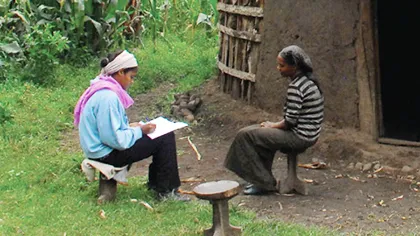22 October 2012
Our researchers helped develop international guidelines for improving mental health care in developing countries, and are now working with governments to put them into practice.
Research led by Professor Graham Thornicroft
Our researchers helped develop international guidelines for improving mental health care in developing countries, and are now working with governments to put them into practice.
Ethiopia, Sierra Leone, Panama, Jordan, Nigeria, Uganda and Honduras are among the countries in the developing world which are beginning to train healthcare workers to use basic treatment guidelines for mental health problems. The guidelines were produced by the World Health Organisation (WHO) in 2010, and jointly led by Professor Graham Thornicroft within our Health Service and Population Research (HSPR) department.
Our researchers have taken a leading role in a campaign to make treatment for mental health problems more readily available in every country in the world. Launched by a series of articles in The Lancet in 2007, the call to ‘scale up’ services from the nascent ‘Movement for Global Mental Health’ spawned several new initiatives, including our Centre for Global Mental Health, and WHO’s Mental Health Gap Action Programme (mhGAP).
mhGAP aims to help WHO member states tackle the ‘treatment gap’ – the disparity between mental health services available and those needed – and has resulted in WHO producing its first practical guidelines for frontline staff.
Lack of knowledge and lack of investment, particularly in poorer countries, means the majority of people around the world do not have access to effective evidence-based treatments.

In many low-income countries, fewer than 10 per cent of people with mental health problems are treated. There are often just a handful of psychiatrists and, in some countries, there are no mental health specialists at all. WHO’s guidelines are therefore designed for non-specialist primary health care practitioners to incorporate into their everyday work.
‘The guidelines give general health care staff, including non-specialist doctors and nurses, community health workers and lay health workers, the skills they need to identify mental health problems and treat them using cost-effective psychological therapies and medication,’ says Professor Thornicroft. The guidelines include information about treating depression, psychosis, bipolar disorder, epilepsy, dementia and other common mental health problems, including problems caused by alcohol and drugs misuse.
The mhGAP guidelines were translated into a dozen languages and sent to 194 UN member states. They were complemented by a series of papers in PLoS Medicine published after consultation with more than 100 experts in 46 countries describing how non-specialist health workers can deliver effective treatments for mental health problems such as depression and schizophrenia.
WHO has also produced training materials to support the mhGAP guidelines, and is now working with individual governments to adapt the guidelines to ensure they are relevant to different health systems and to encourage them to train primary care staff.
Professor Thornicroft and colleagues at our Centre for Global Mental Health are also helping governments in South Africa, Uganda, Nepal, Ethiopia, India and Nigeria to put the mhGAP treatments guidelines into practice through the six-year Programme for Improving Mental Health Care (PRIME). PRIME also aims to develop strategies for ‘scaling up’ services that can be shared with other countries.
In 2011, The Lancet ran a second series of high profile articles about global mental health, this time documenting evidence of the impact of the WHO mhGAP programme and the slow but sure progress that had been made since 2007. At least 60 countries were already training primary care health workers and introducing changes to make treatment for mental health problems more accessible to those who need it.
References
- Thornicroft, G. Most people with mental illness are not treated. The Lancet, 2007; 370: (9590) 807-808
- Saxena S et al. Resources for mental health: scarcity, inequity and inefficiency. The Lancet, 2007; 370: 878-89
- Chisholm D, et al. Scale up services for mental disorders: a call for action. The Lancet, 2007 Oct 6; 370 (9594) 1241-52
- Mari, J et al. Packages of care for schizophrenia in low- and middle-income countries. PLoS Medicine, 2009; 6: (10)
- Patel V et al. Packages of care for mental, neurological, and substance use disorders in low- and middle-income countries. PLoS Medicine, 2009; 6: (10)
- Dua T et al. Evidence-based guidelines for mental, neurological and substance use disorders in low- and middle-income countries: summary of WHO recommendations. PLoS Medicine, 2011; 8: 1-11
- Eaton J et al. Scale up of services for mental health in low-and middle-income countries. The Lancet, 2011 October 29; 378
